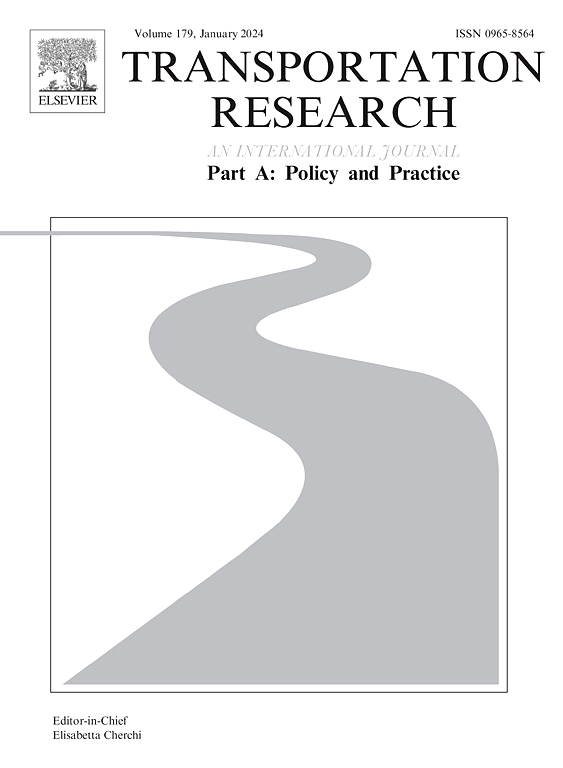Within-day variation in the rebound effect from fuel efficiency standards and implications for road congestion
IF 6.8
1区 工程技术
Q1 ECONOMICS
Transportation Research Part A-Policy and Practice
Pub Date : 2025-07-18
DOI:10.1016/j.tra.2025.104588
引用次数: 0
Abstract
Travel demand and congestion fluctuate throughout the day, but temporal heterogeneity in travel demand elasticities is often overlooked. I estimate within-day variation in the fuel economy elasticity of travel demand, illustrating the timing of the rebound effect — when higher fuel efficiency standards increase mileage by decreasing per-mile costs. Using multiple empirical strategies and data sets, I find that drivers are most elastic during peak demand periods that coincide with morning and evening commuting hours. Mode switching for shorter commute trips in areas with low-cost alternatives appears to drive much of the within-day heterogeneity. Further, accounting for temporal heterogeneity in the rebound effect has the potential to determine whether the congestion costs of a fuel economy improvement exceed the pollution benefits.
燃油效率标准和道路拥堵影响的反弹效应在一天内的变化
出行需求和拥堵在一天中波动,但出行需求弹性的时间异质性往往被忽视。我估计了旅行需求的燃油经济性弹性在一天内的变化,说明了反弹效应的时间——当更高的燃油效率标准通过降低每英里成本来增加里程。使用多种经验策略和数据集,我发现司机在高峰需求期间最具弹性,这与早晚通勤时间相吻合。在有低成本替代方案的地区,通勤时间较短的模式转换似乎在很大程度上推动了一天内的异质性。此外,考虑到反弹效应的时间异质性,有可能确定燃油经济性改善的拥堵成本是否超过污染效益。
本文章由计算机程序翻译,如有差异,请以英文原文为准。
求助全文
约1分钟内获得全文
求助全文
来源期刊
CiteScore
13.20
自引率
7.80%
发文量
257
审稿时长
9.8 months
期刊介绍:
Transportation Research: Part A contains papers of general interest in all passenger and freight transportation modes: policy analysis, formulation and evaluation; planning; interaction with the political, socioeconomic and physical environment; design, management and evaluation of transportation systems. Topics are approached from any discipline or perspective: economics, engineering, sociology, psychology, etc. Case studies, survey and expository papers are included, as are articles which contribute to unification of the field, or to an understanding of the comparative aspects of different systems. Papers which assess the scope for technological innovation within a social or political framework are also published. The journal is international, and places equal emphasis on the problems of industrialized and non-industrialized regions.
Part A''s aims and scope are complementary to Transportation Research Part B: Methodological, Part C: Emerging Technologies and Part D: Transport and Environment. Part E: Logistics and Transportation Review. Part F: Traffic Psychology and Behaviour. The complete set forms the most cohesive and comprehensive reference of current research in transportation science.

 求助内容:
求助内容: 应助结果提醒方式:
应助结果提醒方式:


